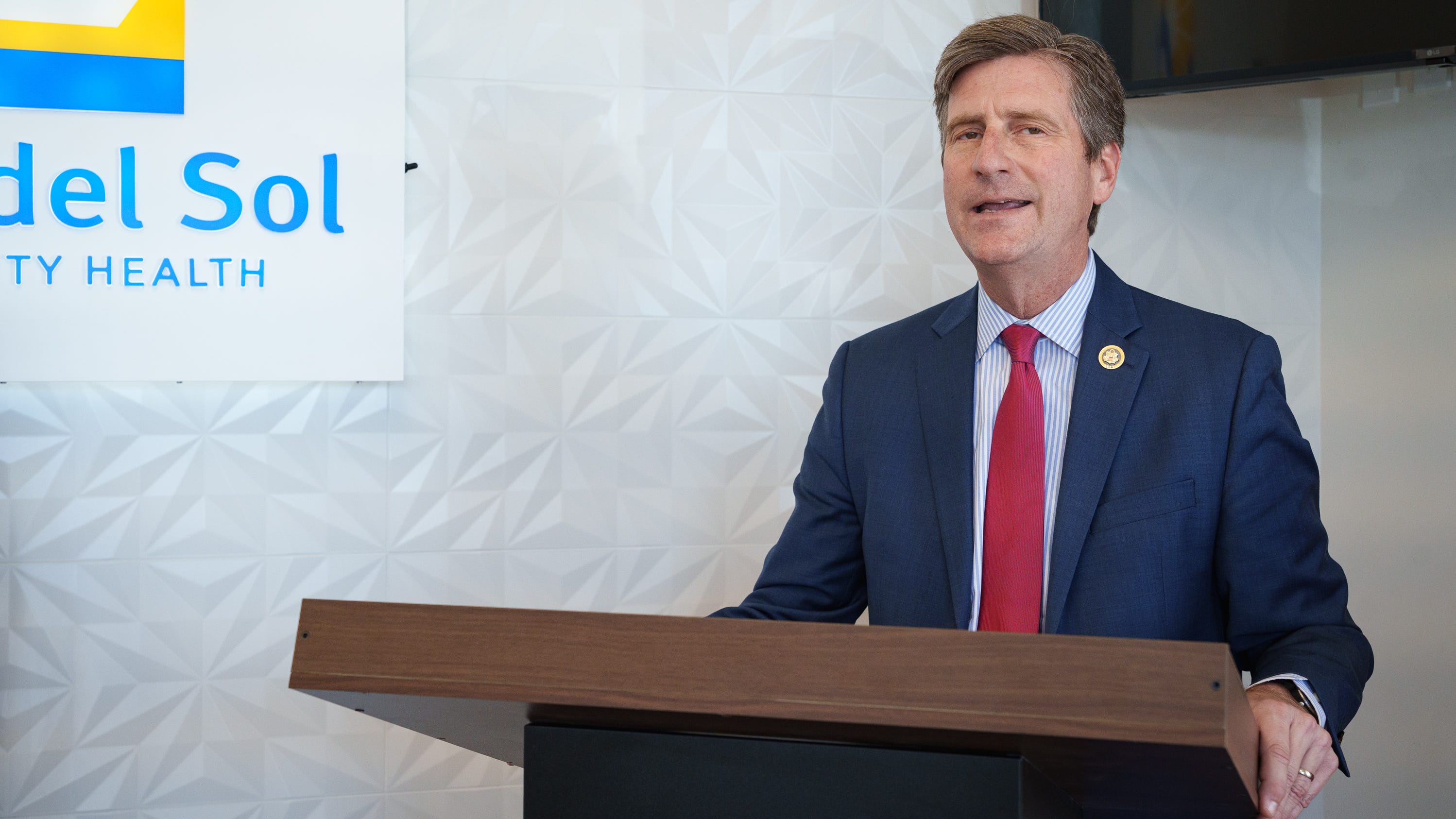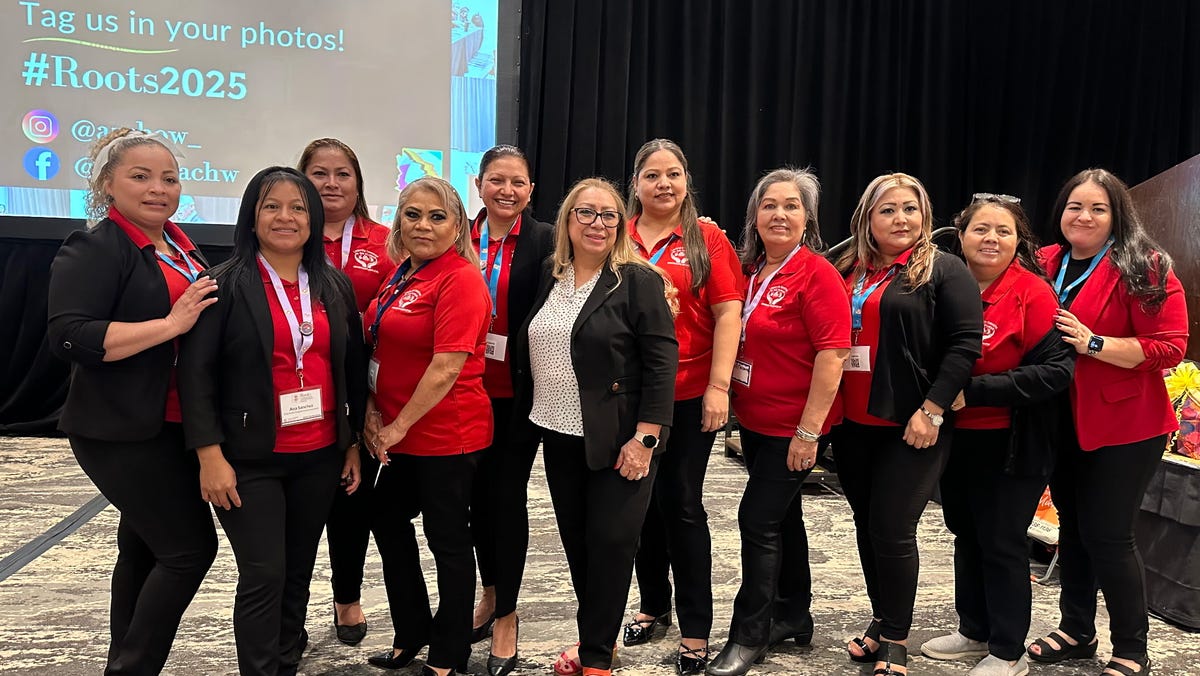
Reps. Stanton, Ansari call on Republicans to reverse health care cuts
Reps. Stanton, Ansari call on Republicans in Congress to work across the aisle to reverse recent health care cuts and avoid a government shutdown.
- Community health workers, or promotores de salud, connect underserved communities with essential health and social services.
- In Phoenix’s Estrella Village, these workers have helped residents gain access to transportation, food and city services.
- Promotores are considered vital first responders who address a wide range of community needs, from healthcare to housing.
Community health workers, known as promotores de salud in Spanish, are more than just health advocates — they’re the frontliners bridging the gap between their communities and the resources and services they need.
Their role is especially crucial in neighborhoods where barriers to health care and social services are more pronounced. In Phoenix’s Estrella Village, that work has become a lifeline, with community health workers helping hundreds of families find relief and support.”It’s, more than anything, giving our soul, our passion, to help our community,” said Brenda Montoya, a community health worker and a leader at Sí Se Puede Neighborhood Association, a community-led organization focused on revitalizing Estrella Village.
When resources are out of reach
Their neighborhood near 71st Avenue and Van Buren Street in southwest Phoenix is a predominantly Hispanic, low-income area with no nearby libraries or other city services. One neighborhood park serves the whole community. Meanwhile, the neighborhood is surrounded by freeways and saturated with warehouses that are home to distribution centers, cigarette manufacturing facilities and meat packaging plants. Massive semi-trucks traverse the roads every day.
U.S. Census data shows that 13% of residents live beneath the poverty line, a rate 20% higher than the rest of Maricopa County. Roughly 20% of the children are considered impoverished, and nearly half the dwellings are mobile homes.
Adding to these challenges, the area is categorized by the U.S. Department of Agriculture as a food desert, which is an urban community with little to no access to grocery stores and fresh food. According to data from the department, a significant portion of households in the area lack access to a car and reside more than a mile away from the nearest supermarket.
“Our community has many strengths, but there are also great needs,” Montoya said. “I myself have experienced many times the lack of information, the few resources that reach us. So now we are making sure that opportunities and resources always reach everyone, especially in the Spanish language, where there is a great need.”
In an area ripe with such challenges, the strong leadership of Sí Se Puede’s promotoras, or community health workers, has become an anchor of support. They are often the first call when someone needs help. Whether navigating health care, finding food or accessing social services, they are the trusted neighbors people turn to.
Montoya emphasized the neighborhood association has mobilized residents and presented organized efforts to ask the city for more resources. She said community leaders have knocked on doors, collected signatures and followed all the city protocols and requirements to request more services in the neighborhood.
The result of that work has brought significant changes in the community, from more city services in the area to more local programs and community engagement.
“There are a lot of changes,” Montoya said. “Now we have the voice of our community to say ‘this is what we want,’ … because we know the community.”
‘The heart of the community’
Floribella Redondo Martínez, CEO and co-founder of the Arizona Community Health Workers Association, described promotores like Montoya as “the heart of the community.”
“Community health care workers are vital,” Redondo said. “They are the champions for our communities.”
The work of promotores involves connecting individuals with health care resources, such as educating them on prevention of serious health conditions like diabetes, Alzheimer’s, or cancer, or ensuring they have access to the medical attention they need.
But their role extends to more areas, according to Redondo. Housing, utilities, transportation, food access, safety, and recreation spaces are all social determinants of health, she said, and added promotores are the “social connectors” who can best address those community needs.
“Everything’s health,” she said. “When we talk about health care, you talk about diseases, chronic conditions, prevention of illnesses. But when you think about an individual, an individual needs a healthy clean home to live, they need clean water; they need to walk, so they need sidewalks; they need to be able to say ‘I feel safe,’ so we need lights in the parks. We have so many needs.”
Berta Carbajal, co-founder of HOPE Network, an organization that also supports and mentors community health workers in Arizona, said promotores are “first responders” who often identify and address issues before outside agencies do.
“These are people that are frontliners that are embedded in the community,” she said. “If you see a need, promotores don’t wait around for someone to create a solution. We do it.”
She said promotores are an essential part of their neighborhoods and know better than anyone what their needs are — an endeavor that has been evident to the institutions trying to reach these communities.
“Most organizations, agencies, they see the value. They look at them as that bridge. Most organizations say, ‘We know that we can get to the community via the promotoras or the promotores,'” she said.
Organizations like the health workers association and HOPE Network equip promotores with the tools and education they need to better serve their communities and react in crises.
“Our focus is to prepare the promotores on the resources, on what to do,” Carbajal said. “We’re just giving them the basics of how do you respond to a family in crisis.”
Montoya said she was grateful for the education, opportunities and resources provided by these organizations.
“We feel more confident in the volunteer work we’re doing because we feel backed by these organizations,” Montoya said. “We’re educating ourselves. We don’t take our role as promotoras lightly; we take it seriously. We know we still have a long way to go, but we continue to learn every day thanks to the support of these community health worker networks.”
Carbajal said she has seen how that work has created change, especially in primarily Spanish-speaking communities such as the one the Sí Se Puede serves.
“I’ve seen lots of communities make changes, all for the better, because of the promotoras,” she said.
Helping Phoenix’s Estrella Village
The impact that community health workers with the Sí Se Puede leadership committee have achieved is visible in those changes.
In 2021, the committee identified a need for public transit in the neighborhood, so they presented a proposal to the city to extend the route of a free neighborhood shuttle so it would reach the area. The proposal was adopted in 2022, allowing residents to have more transportation options — a much-needed service for families without cars and older adults needing rides to grocery stores or medical appointments.
They have also received repairs and speed humps on neighborhood streets that had been damaged by the heavy-load trucks constantly passing through the area and where cars used to speed, even near school zones.
Moreover, they have connected the area with organizations that provide support to residents. The association hosts food drive events in partnership with ICNA Relief that serve about 140 families in the neighborhood every month, Montoya said. Another partnership with Advance Community brings hot meals every week to a senior living facility in the area.
These collaborations with nonprofits and agencies have also brought workshops, classes and resource fairs into the community, on top of helping individual families connect with the resources they need.
“(We want) more organizations to know and see how they can support this community,” Montoya said. “For the most part, we are Latinos, Hispanic, but we always have great love and great determination to move our community forward.”
Building the future of community health workers
AZCHOW, the organization Redondo co-founded, is a network of more than a thousand community health workers across all 15 counties and 19 tribes in Arizona. The organization started in 2001 with the goal of providing community health workers with the resources they need to support their communities.
For Redondo, part of that is making sure their role is recognized by policymakers, providers, organizations, and the general public.
“Even though we have been working for so many years and we believe that we’ve got it, that everybody knows, we’re wrong — we have not got it and people still don’t know,” she said.
She added she would like to see more institutions recognize and support the valuable work community health workers do.
“We cannot live without community health workers,” Redondo said. “Providers that have worked with community health workers before say, ‘I don’t know what I have done those past 10 years that I didn’t have a CHW working with me.’ … because of the support, because of the capacity of CHWs and what they bring into the health system.”
She also encouraged more people to become promotores in their communities and take an active role in addressing the needs of their neighbors.
“Go for it,” she said. “The compensation of being a community health worker is, yeah, we have a lot of great opportunities, a lot of great jobs —but mostly, it’s the life experience that you take with you. The opportunity to bring your passion, your compassion, but also the care for the ones that you love.”
To become a community health worker, a person does not need a title, a degree or extensive experience, Redondo said. They only need the passion to serve others.
“When you’re a community health worker, you’re here to serve,” she said. “You’re here to provide, you’re here to open spaces where individuals can feel supported, heard, and also guided to receive the resources and services they’re looking for.”
For María Margarita Saucedo Mercado, one of the newest members of the Sí Se Puede leadership committee, that commitment is deeply personal. She said becoming a promotora has helped her connect with her community, and it fills her with pride to be part of the work.
“I feel very proud, very happy to be able to reach the community,” she said. “I bring them great joy, a big smile, and it fills me with joy and happiness to be serving people who need it.”
